The Best Job Costing Software
Job costing software helps construction companies of all sizes and types stay on budget and ensure profitability. We evaluated top options for features like change order management and real time cost tracking.
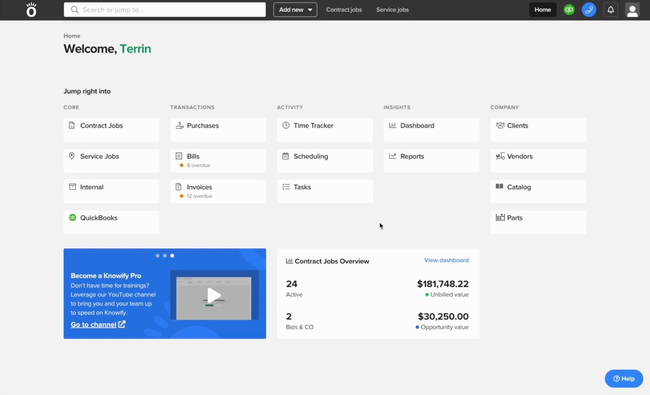
- For residential, commercial, and general contractors
- Cloud-hosted
- Syncs with QuickBooks
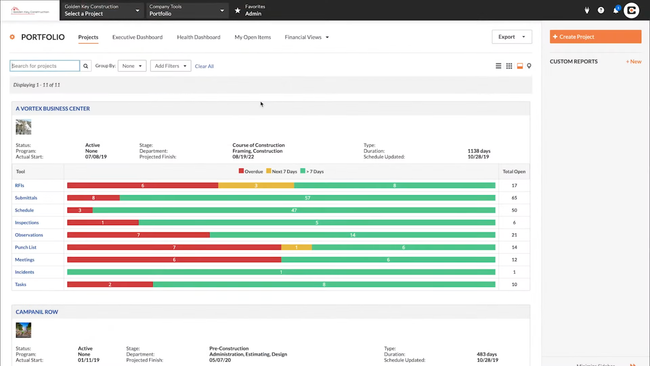
- Real-time communication for all employees
- Optional financial management add-on
- Unlimited users, documents, photos, and data
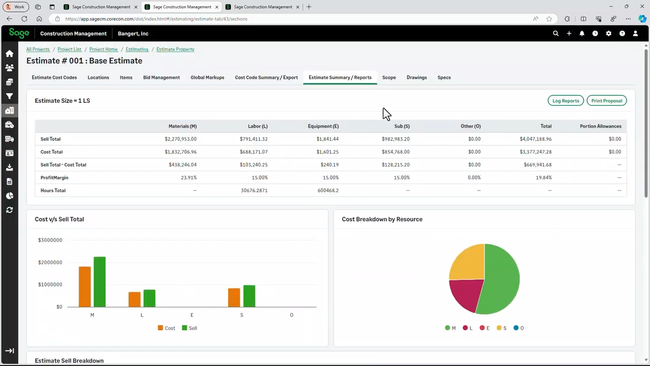
- For small to mid-size businesses
- User-friendly
- Mobile on Palm, Blackberry, Windows, and Apple iPhone
Job costing software gives contractors visibility into the costs and profitability of their construction projects. These tools break down and organize construction expenses by cost codes, allowing contractors to track labor, material, and equipment costs to avoid overruns and maintain profitability. Our team has compared the top job costing solutions available to help businesses find the right solution for their needs:
- Knowify: Best Overall
- Procore: Best for Commercial Contractors
- Sage Construction Management: Best for Budget Tracking
- JobTread: Best for Estimates
- Buildertrend: Best for Residential Builders
- Foundation: Best for Job Cost Accounting
Knowify - Best Overall
Knowify’s job costing module can help small to midsize contractors stay under budget and have more profitable jobs. You can track specific budgets vs. actuals in real time, such as materials, labor, equipment, and miscellaneous costs. This allows you to know exactly where you allocate expenses so you can adapt your plan as the project progresses to ensure profits.
Additionally, you can view the current and projected profitability for every job on one screen. This gives you a better overview of the total cost from any project phase, along with a work-in-progress (WIP) report so you know when to bill your client. And when you approve change orders, the dashboard automatically updates to reflect the changes.
Knowify can be used by both residential and commercial contractors alike, and it includes integrated project management tools to create an all-in-one system. It also integrates with QuickBooks Online, so you can sync your accounting and job costing together. Pricing starts at $1499/month, but job costing and project management are only available on the Advanced plan, which starts at $311/month, plus $10/user/month. Yearly billing discounts are also available.
Procore - Best for Commercial Contractors
Procore is your complete construction project management solution. This cloud-based product contains a variety of features to assist with scheduling, job costing, invoicing, and contract management.
The job cost module allows you to view job cost summary data and compare them against committed costs for each project. You are also able to drill down into the specific details of each transaction to audit even the smallest line items.
Sage Construction Management - Best for Budget Tracking
Sage Construction Management (formerly Corecon) is a powerful, user-friendly cloud-based software suite with the tools you need to manage construction projects from preconstruction through closeout. Job costing is one of the main features contractors look for in software. Corecon handles project related financials, i.e. subcontracts, change orders, AIA invoicing, and budget tracking. Bid analysis tools are available to analyze vendor pricing side by side, and the team-based software allows multiple users to work on an estimate simultaneously.
JobTread - Best for Estimates
JobTread end-to-end construction management software provides everything your team needs from initial estimating to final project completion. Features include everything from customer relationship management to budgeting and invoicing.
JobTread serves small to mid-size construction companies throughout the US and internationally, whether they are homebuilders, remodelers, or general contractors. Annual subscription pricing for JobTread starts at $199 per month for the first user and $20 per additional user.
Buildertrend - Best for Residential Builders
Buildertrend is a construction management software designed to connect teams, improve efficiency, and increase profits for construction companies. This cutting-edge, cloud-based solution includes tools for Estimating, Scheduling, Change Orders, Client Communication, and Document Management, covering everything you need during the construction process. Bid management features help you reduce costs and accurately price out projects.
Foundation - Best for Job Cost Accounting
Foundation Software is construction accounting software built for contractors who need detailed job costing directly tied to their financials—something project management tools alone can’t provide.
The module tracks job costs at a granular level, including labor, materials, equipment, committed costs, and subcontractors. All costs are then tied directly to payroll, accounts payable, receivable, and the general ledger. Contractors can drill into job costs broken down by jobs, phases, cost code, or individual activities, helping catch cost overruns early. The system also includes certified payroll, union, reporting, AIA billing, and work-in-progress (WIP) reporting, making it well-suited for contractors of all sizes and industries.
Foundation starts at approximately $400/month for small contractors and is a strong fit for specialty, heavy civil, government, and self-performing contractors who need full integration between job costing and back-office accounting.
What is Job Cost Software?
Job cost software facilitates the assignment of costs to individual cost categories in order to enable improved cost control and job profitability. Sometimes offered as part of construction management software, these solutions feature tools for streamlining equipment, material, subcontractor, and labor costing processes.
Primarily used by manufacturing and construction companies, job costing software can accurately report real-time costs of any particular project to better manage cash flow, invoicing, and expenses. Many solutions also integrate with inventory management and accounting platforms to create comprehensive systems to help businesses carry out work as efficiently and precisely as possible.
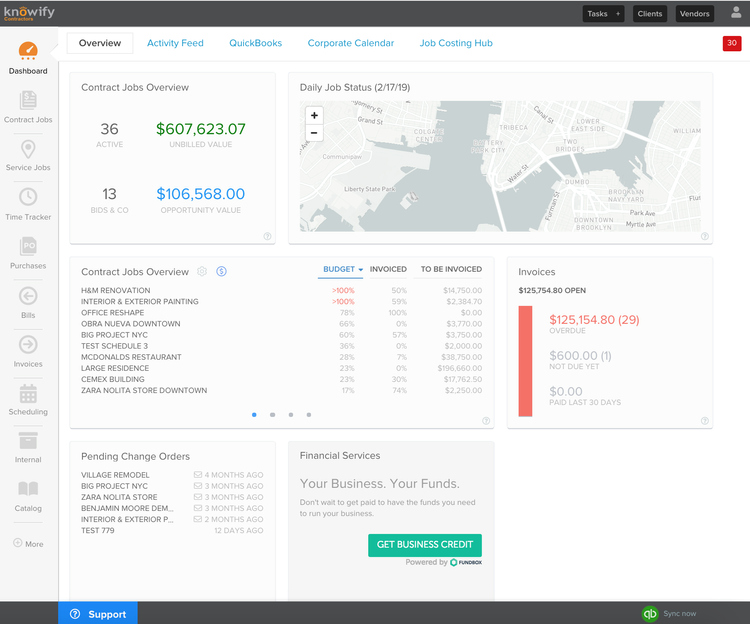
Key Features
Job costing software is an essential tool for any construction business to track, assess, and carry out work with an understanding of ongoing costs. To achieve this, the key features of a standalone job costing software include:
| Feature | Functionality |
|---|---|
| Job estimates | Forecasts potential job costs based on historical data on previous projects, balanced alongside other pricing factors |
| Labor costing | Uses attendance and time tracking to calculate costs associated with employee labor on specific jobs |
| Equipment costing | Determines the assignment of equipment rental or acquisition costs to specific jobs; manages complex situations such as split job cost or direct/indirect cost divisions |
| Material costing | Tracks expenditures on supplies and other materials used in the execution of job work |
| Subcontractor costing | Provides an overview of costs incurred through hiring subcontracted service providers on construction projects |
| Time tracking | Ensures labor costs are accurately entered into timesheets of workers to reflect their time onsite and on the job |
| Customizable cost categories | Builds customizable cost categories with more granular specifications of cost types than what can be provided through predefined cost categories |
| Job phase tracking | Divides jobs into different phases enables another reporting dimension useful to improve the visibility of actual costs on more complex jobs |
| PO and customer payment tracking | Offers better visibility into accounts receivable by reconciling customer purchase orders and payments based on incurred job costs |
| Inter-job profitability/expense reports | Compares the potential profitability of jobs to determine which ones to pursue; use templates to create streamlined bids |
Primary Benefits
The obvious benefit of job costing software is to let construction companies accurately and completely track the financial progress of any job. However, there are several more advantages to implementing software to automate your job costing:
- Improve price setting based on historical data: Modules analyze the cost of labor, equipment, materials, and subcontractors to determine the best possible prices for job estimates, ensuring organizations aren’t leaving money on the table by undercharging for work in progress (WIP). Companies can adapt to projection forecasting on the fly to stay on budget.
- Reduce workflow inefficiencies: Job costing software can help uncover inefficiencies in the execution of job work, identifying unprofitable jobs or unexpected problems that could contribute to a delay or work stoppage. Tools to help manage and understand these efficiencies can improve each job’s process and increase overall job profitability.
- Lower administrative costs: Rather than relying on manual data entry processes or a patchwork of spreadsheets, job costing software can automatically put costs and estimates into one streamlined interface, reducing the need for additional administrative work. Data can be imported from multiple locations or through software integrations, making it easier to estimate the price of jobs and calculate payroll expenses.
- Target profitable jobs: While it may be tempting to pursue the largest jobs possible, bigger doesn’t always mean better. Construction estimating can help determine the profitability of any job based on size and type, helping you take advantage of your best capabilities.
- Better estimates: By understanding the true cost of labor, materials, and time, job costing software makes it easy to provide customers with accurate estimates that reflect the true cost of work.
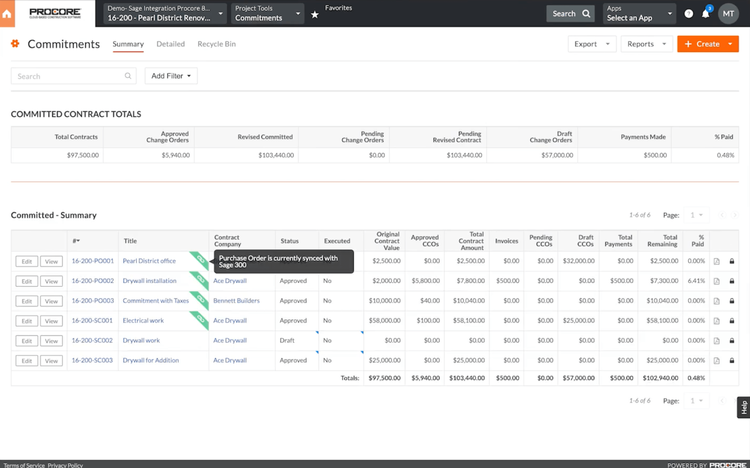
How to Choose
Businesses across the construction industry choose job costing software to better anticipate their project costs, reducing unplanned spending. However, you need to select the right construction job costing software for your specific business to benefit the most.
Accurate estimates and job costing may be accounted for in very different ways, so choosing your business may come down to its size and scope:
- Small businesses may prefer standalone job costing software that allows them to move away from QuickBooks or a general construction management software for a more comprehensive job costing solution.
- Medium businesses should consider a comprehensive job costing software package that enables better cost tracking of complex projects through automation.
- Large businesses may be best equipped with job costing software that fully integrates with additional construction-related solutions, such as project management software, inventory management software, and construction accounting software.
Further, specialized construction companies often select a solution based on what modules are offered to fit their particular needs. For instance, the costs associated with a plumbing job are very different from that of an HVAC project. Some software suites add-on modules to address these industry-related differences.
Pricing Guide
Pricing for job costing software varies widely based on factors like your company size, user count, required features, and deployment method. General ranges include:
| Tier | Size | Average Cost | Examples |
|---|---|---|---|
| Low Tier | 1–10 employees | $1,000 – $5,000 per year | JobTread, Knowify, Buildertrend (Essentials plan), Houzz Pro |
| Mid Tier | 10–50 employees | $5,000 – $25,000 per year | Buildertrend, Buildxact, Contractor Foreman, UDA ConstructionSuite, Sage Construction Management |
| High Tier | 50–200 employees | $25,000 – $100,000 per year | Viewpoint Spectrum, Jonas Construction Software, Sage 100 Contractor, PENTA ERP, COINS, Procore |
| Enterprise Tier | 200+ employees | $100,000+ per year | CMiC, Sage 300 Construction and Real Estate, Viewpoint Vista, COINS, PENTA, Microsoft Dynamics 365 with Project Operations |
Market Trends
Here are some market trends job costing software developers are currently taking advantage of:
- Enhanced business intelligence (BI) capabilities: Software that takes full advantage of data analytics offers greater insights into job costing with more accuracy and better forecasting capabilities. As tools like artificial intelligence and machine learning become more prominent in the marketplace, expect these enhanced capabilities to grow even further with time.
- Cloud-based software: Many vendors have begun offering cloud-based versions of their job costing software, making it easier to access information from any web browser instead of being tied to an on-premise solution. There are even mobile apps accessible on iOS and Android devices to allow further freedom.
- Integrating legacy software solutions: As previously mentioned, some businesses currently use an all-in-one ERP, project management, or construction management software solution rather than a standalone job costing software tool. Many vendors now offer multiple ways to integrate standalone job cost software with existing systems.





































